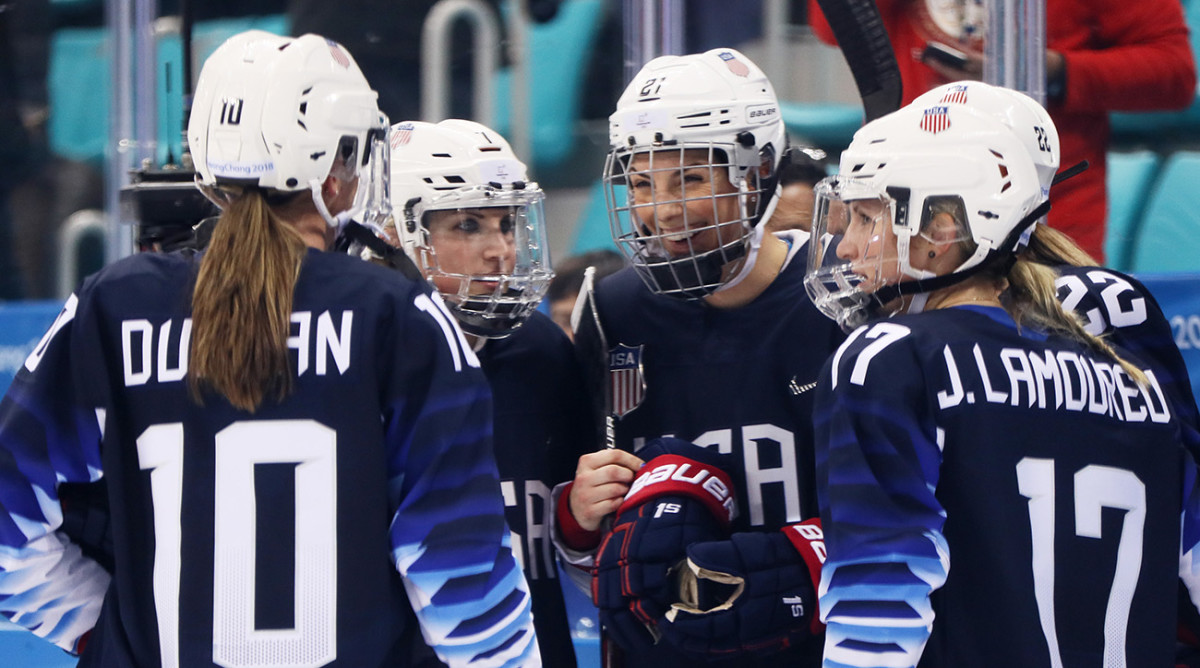U.S. Women's Hockey Team 'Fearless' Entering Gold Medal Rematch With Canada
GANGNEUNG, South Korea — They have had one thousand, four hundred and sixty-two days to think about a single minute. Who knows how that has affected their lives? Who knows how many workouts they pushed through, how many nights they stayed home, how many times they flopped around in bed, unable to sleep, because of that one minute?
The U.S. women’s hockey players wear keys that read FEARLESS on them because of that minute.
They adjusted their training methods because of that minute.
They promised to call out each other more because of that minute.
“Hindsight is 20-20,” U.S. forward Meghan Dugghan says. “You lose a gold medal and you say to yourself, ‘What should we have done?’ Had we won, it would have been different. You say, ‘We did everything right!’”
They have replayed that minute a million times, so you can do it once. With less than four minutes left in the gold medal game in Sochi in 2014, the U.S. led, 2–0. Canada’s Brianne Jenner scored on a backhander to make it 2–1.
Still, the Americans held a 2–1 lead with one minute remaining. Canada’s Rebecca Johnson made a terrific pass to Marie-Philip Poulin, right in front of the U.S. net, and Poulin scored to tie the game with 54 seconds left. Poulin scored again in overtime to win it.
That minute was bigger than a minute though. It was bigger because, even after Canada scored to cut the lead to 2–1, the Canadians pulled their goalie and the U.S. cleared a puck toward the empty Canada net. The Canadians could not stop it. But the post did.
“We were inches away from gold,” Duggan says. “And it doesn’t mean we regret the silver. It’s just, in that moment, it’s pretty difficult. No one trains as hard as we do for second place. You’re not skating laps around the ice, thinking, ‘Second! Second place!’”
That minute was bigger than a minute because of the history between the two teams. There is really no comparison in sports: Imagine Duke and North Carolina playing for the men’s basketball national championship every year.
There have been 18 women’s hockey world championships since 1990. The U.S. and Canada have played each other for the gold medal 18 times. Only once, in 2006, did one of them fail to make the Olympic gold medal game (the U.S. had lost to Sweden in the semifinals).
The Americans have done quite well in the world championships. They have won four straight, seven out of eight, and eight out of 10. But there is nothing like Olympic gold for a U.S. women’s hockey player, and they have not won Olympic gold since 1998. They have been better than Canada everywhere except at the Olympics, and they will carry this knowledge into Gangneung Hockey Center on Thursday.
The U.S. plays a lot of games.
But the U.S. really only plays one game.
The last four years have been a slow countdown to that one game. This year’s Olympic tournament has been all about that one game. The semifinals did not feel like semifinals. They felt like pregame warmups. The U.S. beat Finland, 5–0. Canada beat Russia, 5–0. And here we are.
Last week, during qualifying, the U.S. played Canada, and it was hard to figure out just what the game meant. Both teams knew there was nothing at stake, but it was a fierce rivalry, and rivalries like this have a way of bringing a little extra contact after the whistle.
We had seen it before. The U.S. was clearly the better team, but Canada won anyway. The final score was 2–1. The Americans outshot the Canadians 45–23, and while shots on goal are not always the most telling stat, they told the story of this game pretty well.
After the game, forward Kendall Coyne of the U.S., who might have been the best player on either team that day, kept saying the U.S. just had to keep playing until it scored, just find a way to get the puck in the net, and by the third or fourth question, even she was amused by her answers: “It’s just finding a way,” she said again, laughing. “Not to be redundant. It’s just finding a way.”
The U.S. players left the ice that day as confident as ever that they are the better team. A post here, a break there, and they would have won. U.S. star Amanda Kessel said if both teams played like that 10 times, the Americans would win “eight times. I feel really good about it. Our team should too. I think we put some doubt in the Canadians’ minds.”
Of course, the Americans have won the world championship eight out of the last 10 times. That has not mattered a bit at the Olympics.
Rosters turn over, days and months pass, and arenas change, but history is inescapable. There will be players in the gold medal game who did not play in 2014, let alone 2010 or 2002. But everybody on the ice will know about the history between the teams at the Olympics. And some have spent four years wondering about that one minute.
“What more could we have done?” Dugghan says. “Did we do everything we could? We turned to the mirror and looked at ourselves. We tried to answer those questions.”
One thousand, four hundred and sixty-two days. They had a lot of time to remember. This is their chance to forget.





